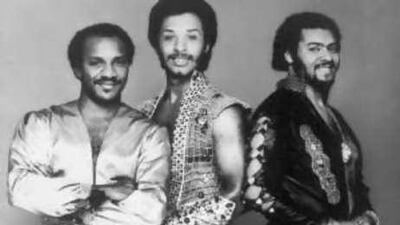The career of Marvin Isley, the bassist for the Isley Brothers during the Seventies funk era, played out against a backdrop of shifting musical tastes and developments in race relations in America that saw the all-black group come to dominate the scene for more than three decades. Formed in the mid-1950s by the three older brothers of the six-strong Isley clan, Ronald, Rudolph and O'Kelly in their hometown of Cincinnati, Ohio, the trio began singing gospel and toured with their brother Vernon until his death in a car crash in 1957. They had limited success until they released Shout on the RCA label. It became a rock classic, propelling them on to AM radio, but a three-year hiatus followed before they had their next hit, Twist and Shout: it sold three million copies and was famously covered by the Beatles.
Signing with Motown, the brothers failed to conform to the model of the "Motown Machine" group, scoring only one major hit, This Old Heart of Mine. Frustrated, they left the label in 1968 and formed their own company, T-Neck, in 1964, at a time when the music business was still mainly the preserve of white men. Their first release, It's Your Thing, was an immediate success. Jimi Hendrix played lead guitar on several of their singles, but it was not until the two younger brothers, Marvin on bass and Ernie on lead guitar, together with their brother-in-law Chris Jasper on keyboards, joined the line-up as backup that the group became a self-sufficient musical unit. The new additions brought a fresh funk and solid rock elements to produce what would become the trademark Isley Brothers sound.
Marvin was the youngest of the Isley brothers, 16 years younger than his eldest sibling, O'Kelly. When the family moved to New York, he attended high school in New Jersey, graduating in 1972. Together with his brother Ernie, he went on to study music at CW Post College in Long Island. The younger brothers studied during the week and played gigs at weekends but, although they played on all the group's recordings after the Isley Brothers left the Motown label in 1969, it was not until 1972 that, together with Jasper, they became fully-fledged group members.
In 1972, the group released their best album to date, Brother Brother Brother, a mixture of funky, percussive numbers and smooth ballads, considered by many to be their seminal album. The three new instrumentalists were formally introduced in the album 3+3, which featured the soul hit, That Lady. It was a successful period for the brothers, elevating them to status of the quintessential soul group, which spawned many imitators and inspired bands from the Commodores to Earth, Wind & Fire. Attired in velvet trousers, frilled shirts and fur-lined jackets, they paraded the sartorial ghetto fashion of the time, popularised by films such as Shaft.
Through the 1970s, they continued to rack up the hits including the Top 10 Fight the Power (1975) and Harvest for the World (1976). During the 1970s, it was Marvin's funky bass playing that powered the group's sound, underpinning the soaring vocal harmonies on hits - most of which he co-wrote. The group incorporated a variety of rock material into their repertoire by composers such as Bob Dylan, Stephen Stills, Todd Rundgren and Carole King, and when disco came along, they jumped on the bandwagon, with Marvin singing backing vocals and playing percussion as well as bass.
By the early 1980s, however, the group's popularity was on the wane and in 1984 it split. The three younger members started to record as Isley Jasper Isley and had an immediate hit with Caravan of Love, their own composition. But the offshoot group did not last long. In 1991, with Kelly (who had dropped the 'O' by then) dead of a heart attack in 1986, Marvin and Ernie decided to rejoin the original Isley Brothers.
In 1992, the brothers were inducted into the Rock and Roll Hall of Fame, but, in the main, the 1990s was not a good decade for them. Marvin and Ronald filed a lawsuit against the singer Michael Bolton for plagiarism and Rudolph left the group to become a minister. Marvin was forced to retire in 1997 due to ill-health. His diabetes had necessitated the amputation of both legs. He admitted publicly that he had ignored his doctor's warnings and later became a spokesman for the American Diabetes Association.
Born on August 18, 1953, he died on June 6 and is survived by his wife, Sheila, a son and two daughters. * The National

